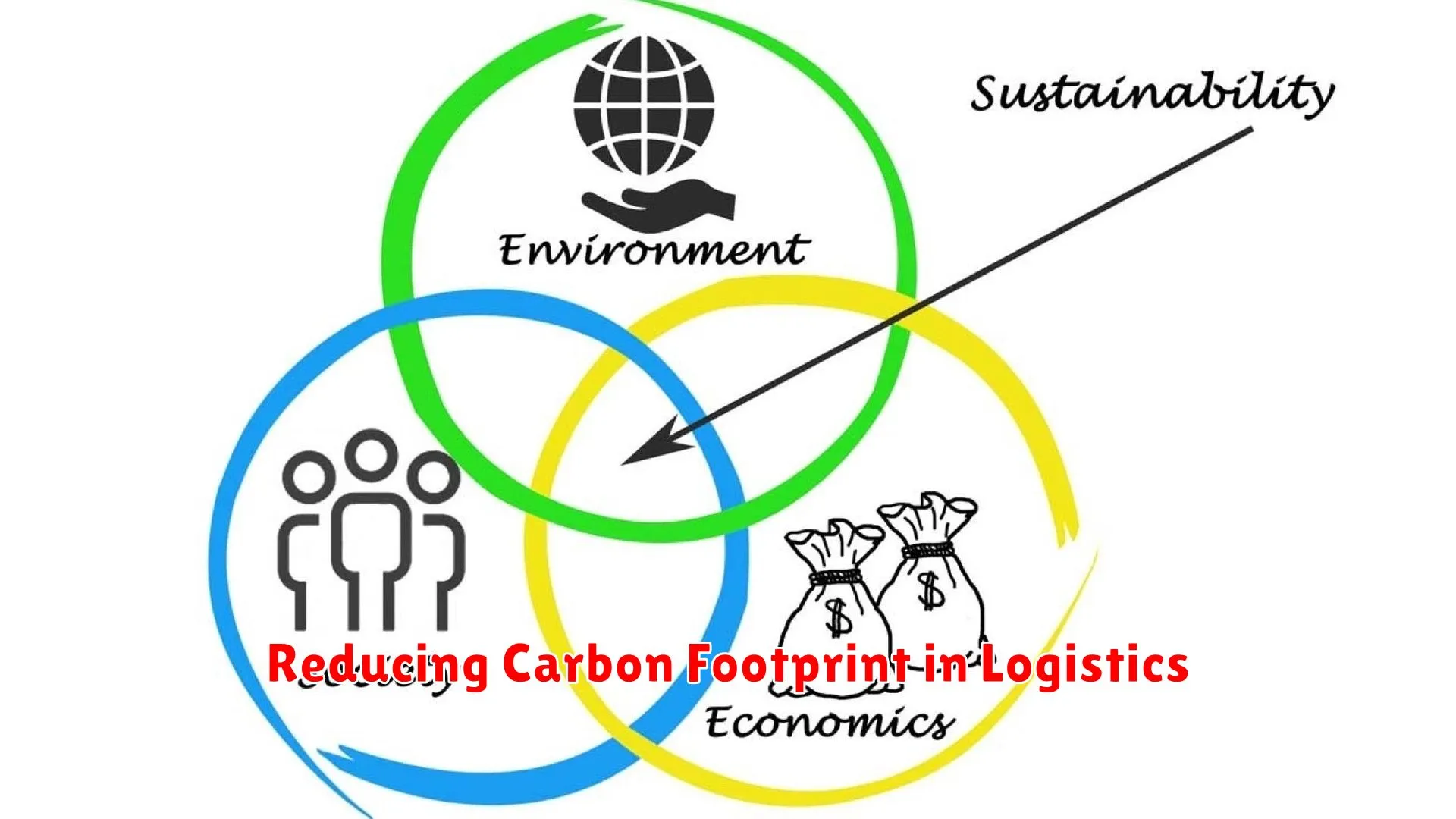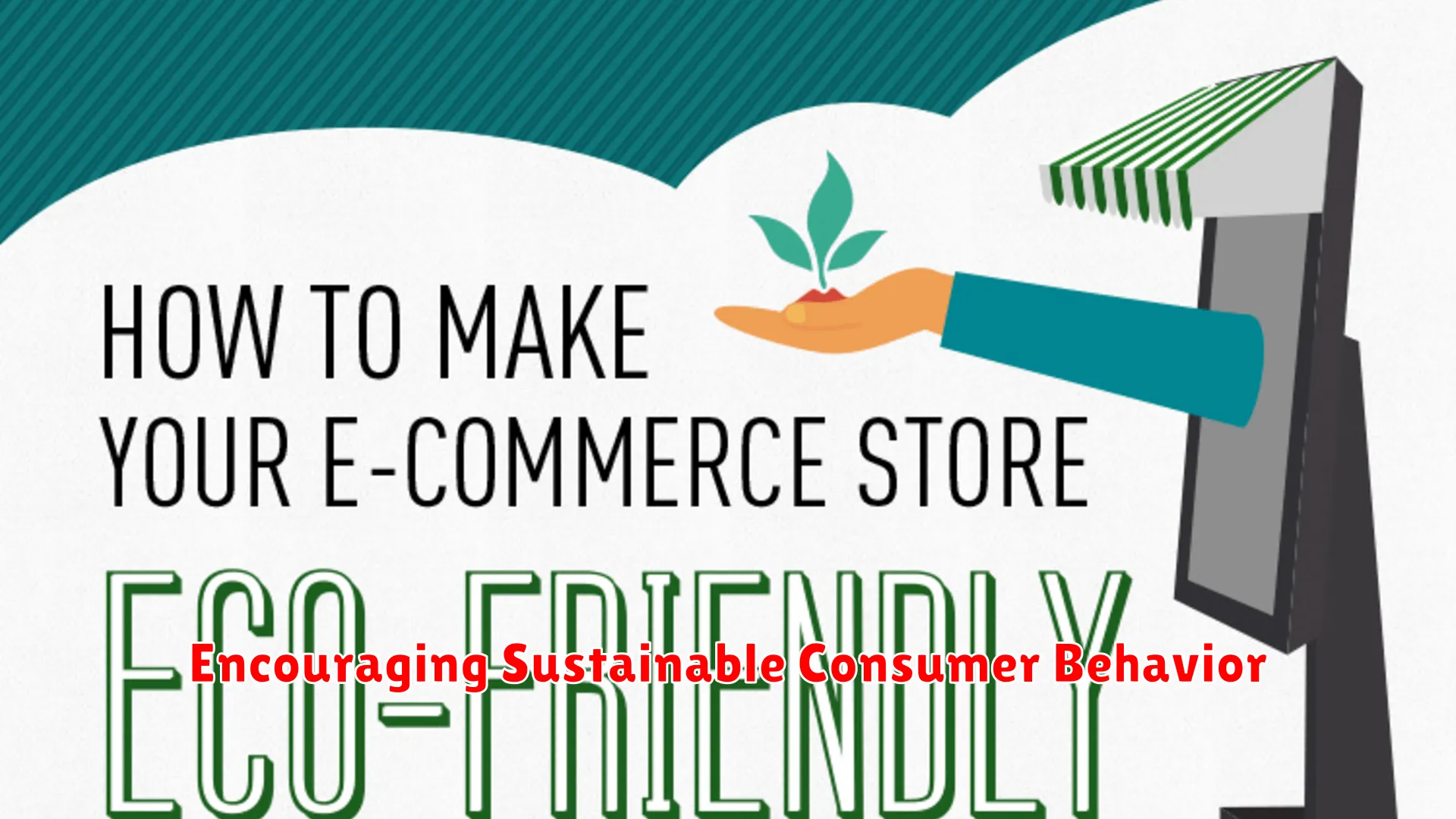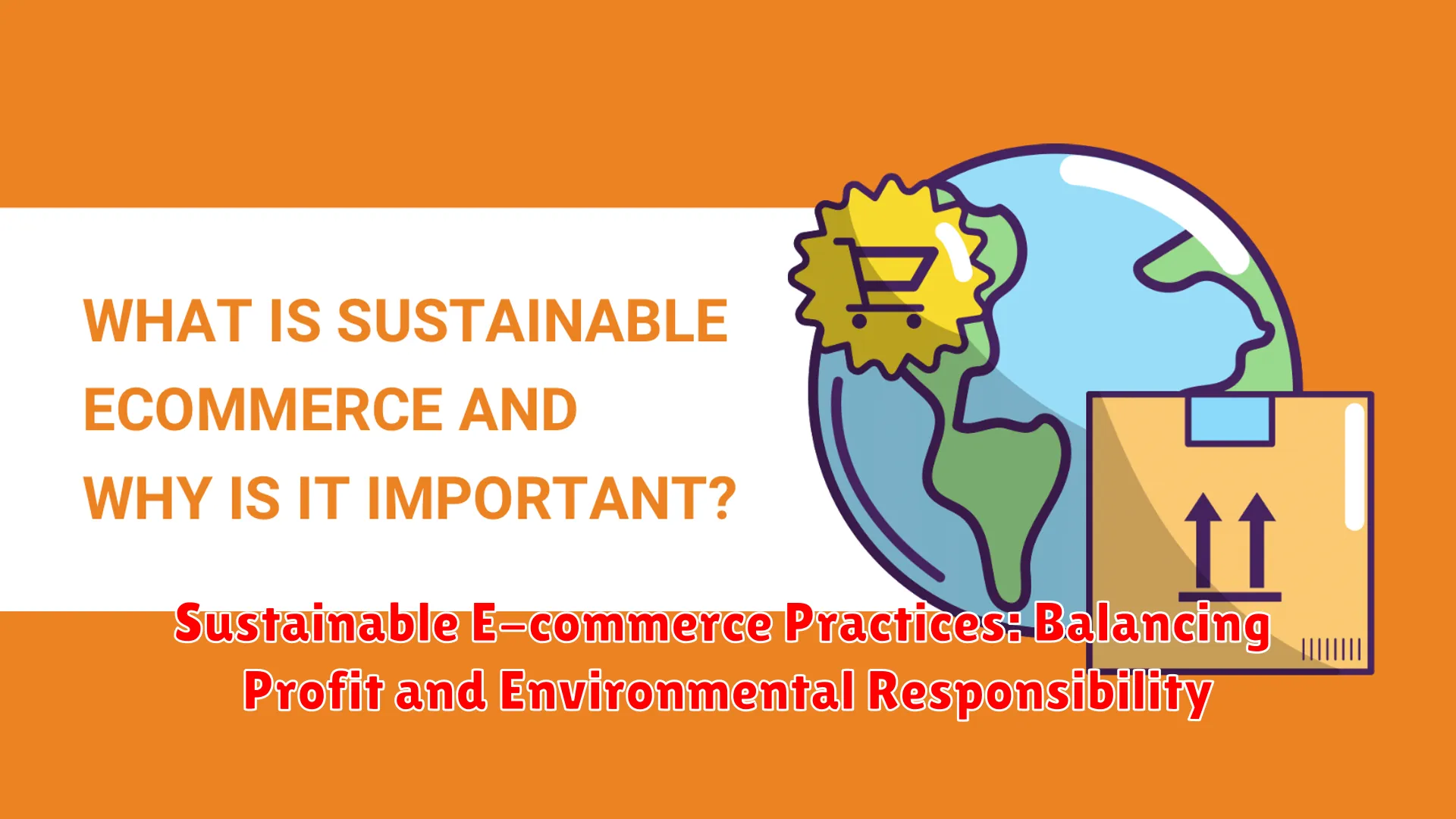In the era of digital economy, e-commerce businesses are increasingly focusing on sustainable practices to balance profit with environmental responsibility. This article delves into the importance of implementing eco-friendly strategies in the rapidly expanding online retail industry.
The Need for Sustainability in E-commerce

In today’s digital era, the e-commerce industry has experienced tremendous growth, providing convenience and accessibility to consumers worldwide. However, this rapid expansion has raised concerns about its environmental impact. As e-commerce transactions continue to increase, so does the need for sustainability in the industry.
Sustainable e-commerce practices play a crucial role in balancing profit and environmental responsibility. Companies need to consider the entire lifecycle of their products, from sourcing raw materials to the delivery process. By adopting sustainable practices, e-commerce businesses can minimize their carbon footprint and reduce waste generation.
Embracing green packaging solutions, optimizing supply chain routes to reduce emissions, and investing in renewable energy sources are some ways e-commerce companies can contribute to a more sustainable future. Consumers are also becoming more environmentally conscious, expecting businesses to prioritize sustainability and transparency.
Moreover, incorporating eco-friendly initiatives can not only benefit the environment but also enhance brand reputation and attract a growing segment of eco-conscious customers. Sustainable e-commerce practices demonstrate a commitment to corporate social responsibility and can lead to long-term success in a competitive market.
Eco-Friendly Packaging Solutions

When it comes to sustainable e-commerce practices, a significant aspect to consider is the adoption of eco-friendly packaging solutions. In today’s digital age where online shopping is on the rise, the environmental impact of packaging materials cannot be overlooked. Businesses need to strike a balance between profitability and environmental responsibility by integrating sustainable packaging practices into their operations.
One effective eco-friendly packaging solution is the use of recyclable materials. This includes cardboard boxes, paper-based padding, and biodegradable plastics. By opting for materials that can be easily recycled or decomposed, e-commerce companies can significantly reduce their carbon footprint and minimize waste generation.
Reusable packaging is another innovative approach that promotes sustainability in e-commerce. Encouraging customers to return packaging materials for reuse not only reduces the demand for new resources but also fosters a sense of environmental stewardship among consumers. Implementing a system where packaging is designed for multiple uses can lead to cost savings and create a positive environmental impact.
Additionally, the utilization of minimalistic packaging can further enhance the eco-friendliness of e-commerce practices. By streamlining packaging design and eliminating unnecessary materials, companies can reduce the overall environmental impact of shipping products. This approach not only benefits the planet but also enhances the unboxing experience for customers.
Sustainable e-commerce practices are essential for preserving our environment for future generations. By embracing eco-friendly packaging solutions, businesses can demonstrate their commitment to environmental responsibility while still thriving in the competitive e-commerce landscape.
Reducing Carbon Footprint in Logistics

As e-commerce continues to thrive, the environmental impact of logistics cannot be overlooked. To achieve a sustainable balance between profit and environmental responsibility, reducing carbon footprint in logistics is crucial.
Implementing Efficient Route Planning
One effective way to reduce carbon emissions in logistics is by optimizing route planning. Utilizing advanced software to map out the most efficient delivery routes can significantly minimize fuel consumption and emissions.
Utilizing Eco-Friendly Transportation
Transitioning to electric or hybrid vehicles and incorporating bicycles or drones for last-mile delivery can greatly reduce the carbon footprint of transportation in the supply chain.
Minimizing Packaging Waste
Sustainable packaging options and minimalist designs can not only reduce material waste but also decrease the weight of shipments, which in turn lowers fuel consumption during transportation.
Embracing Technology for Inventory Management
Implementing automated inventory systems can optimize storage space, reduce excess inventory handling, and streamline order fulfillment processes, resulting in fewer trucks on the road and lower emissions.
Green Marketing Strategies for E-commerce

In today’s digital age, where e-commerce platforms play a significant role in the global economy, it is crucial for businesses to implement green marketing strategies to promote environmental sustainability while maintaining profitability. Here are some effective strategies for e-commerce businesses to adopt:
1. Product Transparency and Eco-friendly Labels
One key strategy is to provide customers with clear information about the sustainability of your products, including materials used, manufacturing processes, and eco-friendly certifications. Utilizing eco-friendly labels and certifications can help consumers make informed decisions and showcase your commitment to sustainable practices.
2. Energy-efficient Operations
Implementing energy-efficient practices within your e-commerce operations can have a significant impact on reducing your carbon footprint. This can involve optimizing packaging processes, utilizing renewable energy sources, and promoting energy-saving measures throughout the supply chain.
3. Sustainable Packaging Solutions
Opt for recyclable or biodegradable packaging materials to minimize waste and reduce environmental impact. Offering options for customers to choose minimal packaging or packaging made from sustainable materials can also enhance your brand’s eco-friendly image.
4. Carbon Offsetting Initiatives
Consider investing in carbon offsetting programs to neutralize your e-commerce business’s carbon emissions. This can involve supporting renewable energy projects, reforestation efforts, or purchasing carbon credits to offset the environmental impact of your operations.
5. Promote Green Lifestyle and Values
Engage with your customers through marketing campaigns that promote a green lifestyle and eco-conscious values. By aligning your brand with sustainability initiatives and advocating for environmental awareness, you can attract environmentally conscious consumers and build a loyal customer base.
By integrating these green marketing strategies into your e-commerce practices, you can not only enhance your brand’s reputation as a socially responsible business but also contribute to a more sustainable future for our planet.
Encouraging Sustainable Consumer Behavior

In the realm of sustainable e-commerce practices, encouraging sustainable consumer behavior plays a pivotal role in achieving a harmonious balance between profit-making and environmental responsibility. Businesses need to take proactive steps to influence and guide consumers towards making more sustainable choices while shopping online.
1. Education and Awareness: Providing consumers with information about the environmental impact of their purchases can empower them to make more environmentally friendly decisions. This can be done through product labeling, eco-friendly certifications, and educational content on e-commerce platforms.
2. Incentives and Rewards: Implementing reward programs for eco-conscious shopping behaviors can motivate consumers to opt for sustainable products. Discounts, loyalty points, or exclusive offerings for green purchases can encourage repeat sustainable buying habits.
3. Collaboration and Partnerships: Working with eco-friendly brands, organizations, and influencers can enhance a company’s sustainability credibility and influence consumer behavior positively. Collaborative efforts can amplify the message of sustainability and broaden its reach.
4. Transparent Communication: Maintaining transparency in supply chains, production processes, and environmental practices builds trust and loyalty among consumers. Transparent communication fosters accountability and allows consumers to make informed decisions supporting sustainability.
The Role of Technology in Sustainable E-commerce

Technology plays a crucial role in shaping the landscape of sustainable e-commerce practices, where businesses strive to balance profitability with environmental responsibility. In the realm of sustainable e-commerce, technological innovations serve as key enablers and drivers of eco-friendly operations that are both efficient and effective.
1. Renewable Energy Integration
One of the pivotal ways technology impacts sustainable e-commerce is through the integration of renewable energy sources in powering operations. By harnessing solar, wind, or hydro energy, e-commerce businesses can significantly reduce their carbon footprint and operate in a more sustainable manner.
2. Data Analytics for Environmental Impact Assessment
Technology enables e-commerce companies to leverage data analytics tools to assess and optimize their environmental impact. Through data-driven insights, businesses can identify areas of improvement, monitor resource consumption, and implement strategies to minimize waste and emissions.
3. Supply Chain Transparency and Traceability
With the aid of technology, e-commerce platforms can enhance transparency and traceability within their supply chains. Blockchain technology, for instance, enables real-time tracking of products from sourcing to delivery, ensuring ethical practices, reducing waste, and promoting accountability.
4. AI-Powered Sustainable Practices
The adoption of artificial intelligence (AI) in e-commerce operations opens up avenues for implementing sustainable practices. AI algorithms can optimize logistics routes, reduce energy consumption, and enhance product design for eco-friendliness, thereby contributing to a more sustainable e-commerce ecosystem.
Case Studies: E-commerce Brands Leading in Sustainability

When it comes to sustainable practices in e-commerce, some brands stand out for their commitment to balancing profit with environmental responsibility. Let’s delve into some case studies of e-commerce brands that are setting the bar high in sustainability:
1. Eco-Friendly Packaging Initiatives
One exemplary case is GreenArrow, an online fashion retailer that has revolutionized its packaging methods by using 100% biodegradable and compostable materials. By eliminating plastic packaging and opting for sustainable alternatives, GreenArrow has reduced its carbon footprint significantly.
2. Carbon Neutral Shipping Practices
EarthShip, an e-commerce platform specializing in home goods, has implemented carbon offset programs for all its shipping operations. By investing in renewable energy projects and reforestation initiatives, EarthShip ensures that its shipping is carbon neutral, demonstrating a strong commitment to environmental stewardship.
3. Product Lifecycle Sustainability
GreenCycle, a tech gadgets retailer, goes beyond selling eco-friendly products by offering a comprehensive product lifecycle program. Customers can return old electronics for recycling and receive discounts on new purchases. This innovative approach promotes circular economy principles and reduces electronic waste.
These case studies showcase how e-commerce brands can lead in sustainability by implementing conscious practices that benefit both the planet and their bottom line. By prioritizing eco-friendly initiatives, these brands inspire industry-wide change and set a positive example for the future of online retail.
Conclusion: The Business Case for Sustainability

In conclusion, embracing sustainable e-commerce practices is not only beneficial for the environment but also for businesses seeking long-term success. By integrating environmentally responsible measures into their operations, e-commerce companies can enhance their brand image, appeal to conscious consumers, and differentiate themselves in a competitive market.
Implementing sustainable practices can also result in cost savings through efficiency improvements, reduce operational risks associated with resource scarcity, and comply with increasingly stringent regulations on environmental responsibility.
Furthermore, by investing in sustainability, e-commerce businesses can future-proof their operations, drive innovation through the development of eco-friendly products and services, and build resilience against the impacts of climate change.
Conclusion
In conclusion, embracing sustainable e-commerce practices is crucial for balancing profit with environmental responsibility in today’s digital marketplace.

